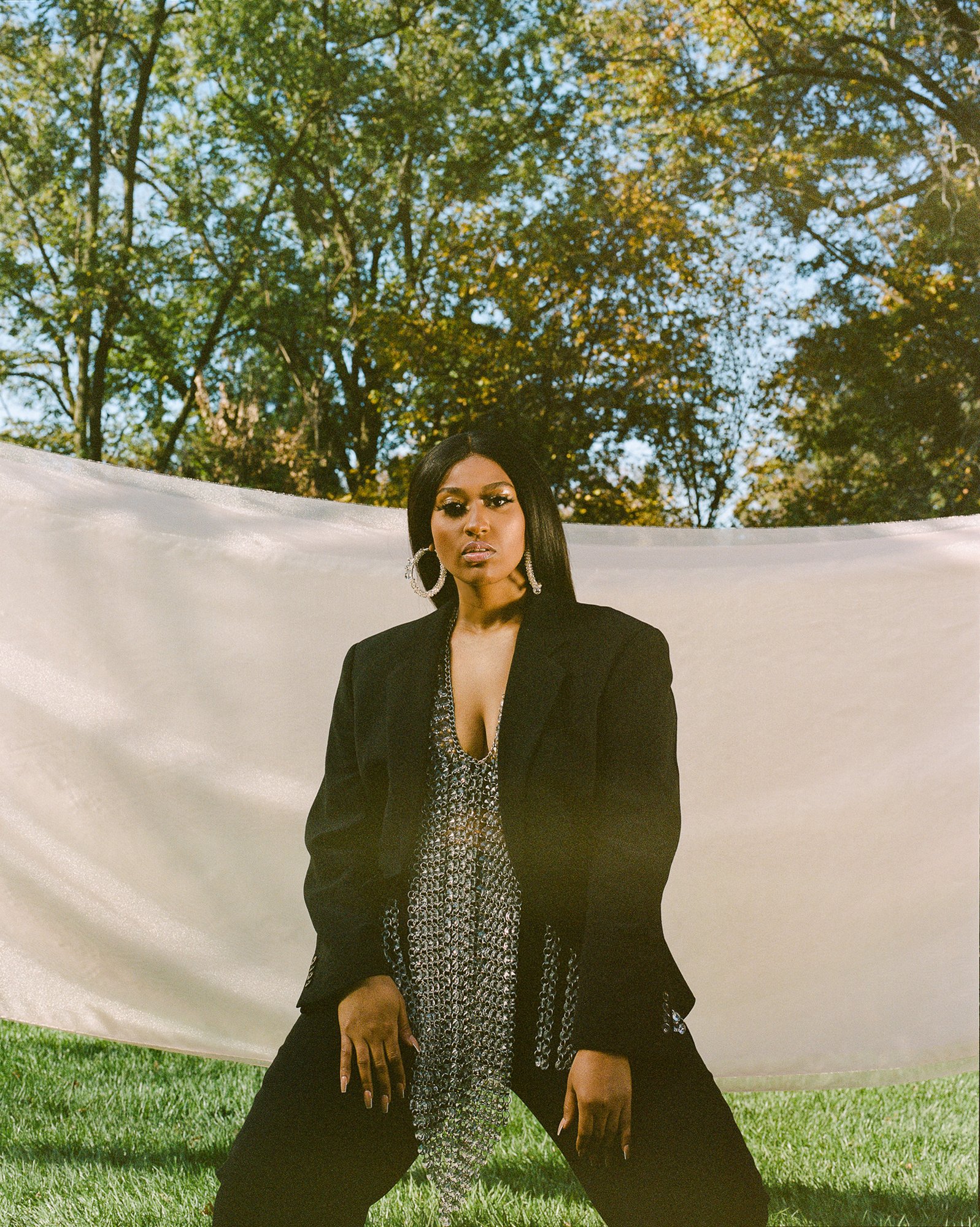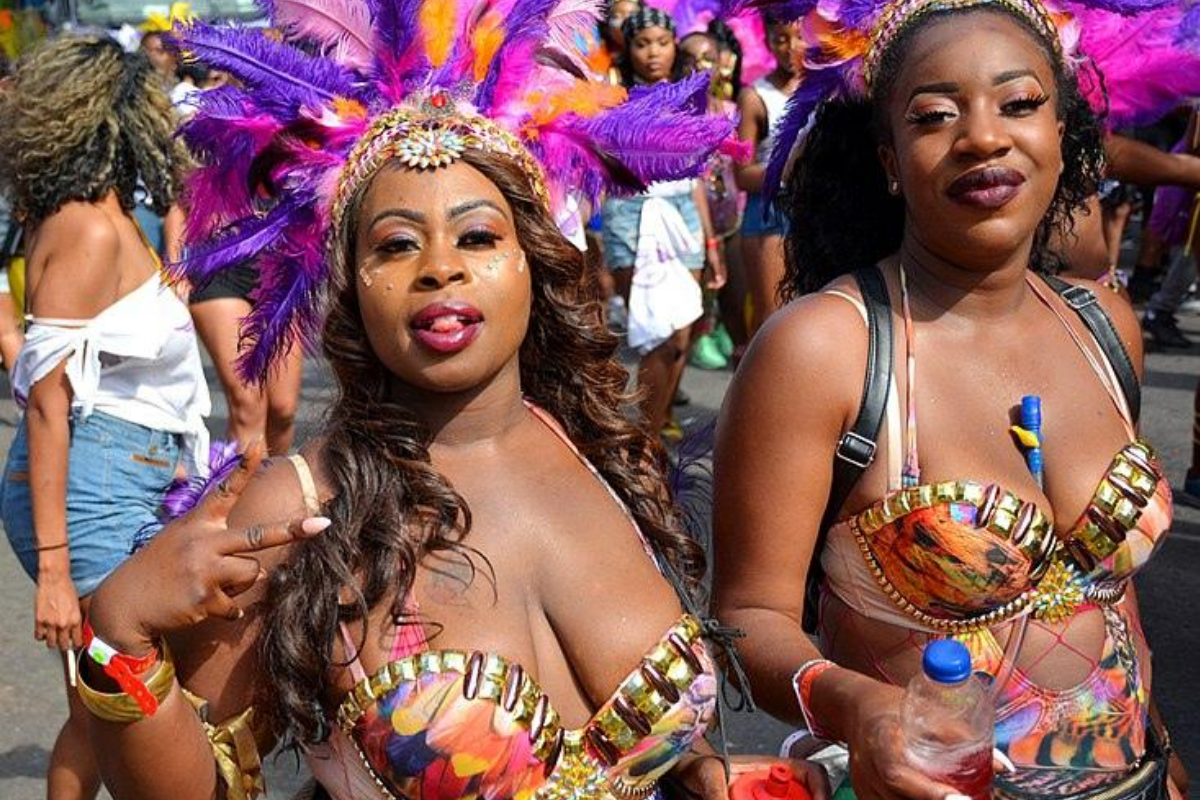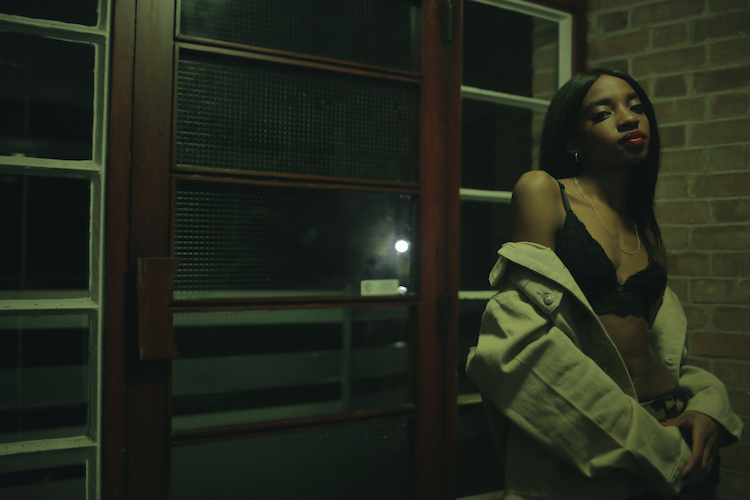‘You’re not the sum of your mistakes’ – Jazmine Sullivan’s comeback is for women who are healing
With Heaux Tales, Jazmine Sullivan has created music-as-therapy. She speaks on using her EP as a purge for trauma and the women who made her.
Timi Sotire
20 Jan 2021

Myesha Evon Gardner
“It’s turning into something I never expected,” Jazmine Sullivan tells me from her Philadelphia apartment, cupping a mug of tea to her chest. After a six-year hiatus, Jazmine has dropped Heaux Tales, a 14-track conceptual EP, tackling love, confidence and heartbreak with an unrivalled level of maturity and nuance. “I didn’t know it was going to be received like this. It’s really helping women feel seen, bringing us together. I’m really happy about that.”
As a living legend in the R&B game, Jazmine’s always written about intimate topics with a healing familiarity, “Why do we love love / When love seems to hate us?” In an age of chronic nostalgia, her riffs and runs hark back to the gospel-inspired era of R&B that produced the likes of Usher and Brandy, while her slinky instrumentation embraces the genre’s shift to pop and hip-hop melodies, earning her the adoration of a new generation of music-lovers. We love to see it.
Now that fewer artists’ voices are trained in the gospel choir, Jazmine is one of the remaining major R&B artists bolstering the powerhouse vocals found in the church. “I grew up singing gospel. And when you’re singing about God, the soul comes out,” she says. Born and raised in Philadelphia, Jazmine’s parents loved music. “They always played the classics, Stevie Wonder, Chaka Khan and Kirk Franklin. That was all I heard around the house.”
“I grew up singing gospel. And when you’re singing about God, the soul comes out”
These musical influences manifest in Jazmine’s soul-bearing signature sound, with the singer-songwriter garnering critical and commercial success from her first three albums. Her iconic raspy voice is either laced over an orchestral arrangement like her debut single, ‘Bust Your Windows’, or accompanied by wavy synths like her 2015-hit ‘Let It Burn’. For Jazmine, Heaux Tales is different, “this project is definitely more thought out. I wanted to go a little deeper and make a project that wasn’t just about how I was feeling”.
That’s why bringing in other women was so necessary for this EP. The interludes, dubbed as ‘Tales’, add thematic weight to the music, “[They] are the meat of the project,” Jazmine tells me over Zoom. “I knew that they’d be risky as far as the content goes.”
Jazmine made sure that Heaux Tales followed a specific structure. Each individual ‘Tale’ explores a facet of ‘heaux-ism’, whether that’s using sex as a weapon (Donna’s Tale), infidelity (Rashida’s Tale) or being dickmatized (Ari’s Tale). Each track acts as a mouthpiece for the women’s stories. Jazmine gives no time debating the morality of the women’s actions, instead choosing to explore why these women feel the way they feel. The project acts as a safe space for women to discuss their trials and tribulations, free from judgement.
“You’re hearing things that people are saying from the heart,” she tells me. There’s a brutal honesty shared in every tale. “They’re talking about experiences that we don’t necessarily discuss outside of the conversations with our girlfriends or therapy.” This project is bigger than Jazmine and her music, the overarching sense of community reminds women of their multifaceted nature. Jazmine continues: “I love the fact that people can hear their perspectives and think: ‘you know what, I understand it. I may not agree with how you handled the situation, but I can understand the root of the thing you’re feeling.’”
“The women on Heaux Tales are talking about experiences we don’t necessarily discuss outside of our girlfriends or therapy”
Between her last album, Reality Show, and this EP, Jazmine explains that she took a six-year break because she had “a lot of personal issues going on”. She explains her mindset at the time: “I need to reflect, I need to think. I get to do that when I’m doing my own thing, away from the spotlight.” The women in her life provided an unfound level of support during this period of reflection. “I owe so much to my best friends, they made me the woman that I am, as well as my mom and the older women I know.”
Yet, Jazmine recognises how this sentiment has been lost on some listeners, with some fans complaining that tracks such as ‘Girl Like Me’ were anti-feminist. The tale that preceded it, Amanda’s Tale, exposes the internal battle faced by women empowered by their sexuality, who sometimes feel like sex is all they can offer. Amanda concludes with the realisation that “I feel moments of sadnеss knowing… just me alone and who I am is not enough”.
Fans rushing to critique ‘Girl Like Me’ missed the whole point of the project. “You gotta let people live and figure it out,” Jazmine says. “There’s no right or wrong answer, a lot of the time everything is just grey.” That’s exactly what happened to Amanda, “in that moment, Amanda was literally figuring things out for herself. She was having a self-awareness moment as she was talking to me”.
“It’s not my fault that I’m not doing what you think I should do”
This quickness to judge others is emblematic of a wider issue in society that Jazmine has fallen victim to. After sharing a photo on Instagram last year, members of the public made unsolicited comments regarding her weight loss, forcing Jazmine to disclose that she had gone on a vegan diet to support her mother’s cancer treatments. When seeing her face as she spoke about this experience, it was clear that the backlash she’d faced hurt. “People are so quick to judge others on their journey and force their expectations on people. When they don’t meet it, they make them feel like it’s their fault. It’s not my fault that I’m not doing what you think I should do,” she adds.
Jazmine does not see herself as better than her critics; at one point she was like them. But she realised this stemmed from trauma, motivating Jazmine to create Heaux Tales. “A lot of the time you think you’ve gotten out of that space, or you’ve grown out of this space, then you realize there’s still trauma you have to deal with,” she says before pausing and looking out the window. “So, yeah, that’s a lot of where the need to purge [in Heaux Tales] really came from.”
Rather than paint an idealistic narrative surrounding womanhood, Heaux Tales recognises the messiness, complexity and contradictions that make up womanhood. Despite this, Jazmine Sullivan stresses that women shouldn’t berate themselves. “You’re not the sum of the mistakes you’ve made. You are a beautiful woman, you’ve made mistakes, but that’s what makes you human. And that’s what makes you you. Give yourself grace.”
Jazmine Sullivan’s Heaux Tales is out now, you can listen on all streaming services.







